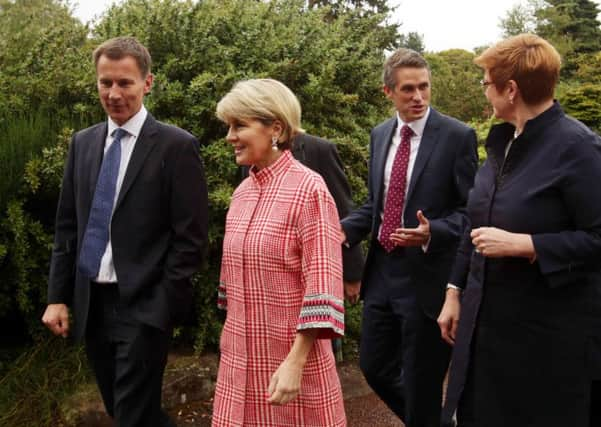Foreign Secretary calls on Nato members to increase defence spending


After meeting with Australian government ministers in Edinburgh, Mr Hunt admitted Donald Trump “had a point” when he complained that some countries were not contributing enough. The US president used last week’s Nato summit to call for member countries to increase their defence spending to 4 per cent of GDP, double Nato’s existing target of 2 per cent.
Mr Hunt and his colleague Defence Secretary Gavin Williamson declined to say whether they thought the UK should go that far.
Advertisement
Hide AdAdvertisement
Hide AdBut Mr Hunt expressed frustration that some countries in the nuclear alliance were not contributing as much as others at time when Europe faced a threat from Russia. According to Nato figures, countries that exceed the 2 per cent target were: the US (3.6 per cent); Greece (2.2 per cent); Estonia (2.14 per cent); UK (2.10 per cent and Poland (2 per cent).
France spends 1.8 per cent and Germany 1.2 per cent.
Mr Hunt said: “Nato has been the foundation of peace in Europe since 1945, but any alliance needs to be based on fairness in terms of the contributions of the members of that alliance.
“He [Trump] singled out Britain as one of the five Nato countries that is meeting the 2 per cent target and he was effusive in his praise for doing that.
“But in terms of other Nato countries who have not met that 2 per cent target or don’t even have a plan to meet that target, he has a point.
He added: “It is very, very important in terms of America’s role in the alliance that they think fair contributions are being made by everyone.”
Mr Hunt and Mr Williamson met Australian foreign minister Julie Bishop and defence minister Marise Payne to discuss post Brexit trade deals, including contingency planning for a “no deal” scenario.
Ms Bishop agreed that Mr Trump had a “valid point” on defence spending She said: “The United States makes a very valid point. We have discussed this at length... there must be more burden-sharing when it comes to defending international rules-based order, when it comes to enforcing the rules and norms, and when it comes to promoting and advocating peace and stability around the world.”
On Theresa May’s Chequers blueprint for Brexit, Mr Hunt said it was a “substantive offer” but would also need “imagination and flexibility”.